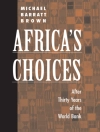The migration experiences, career paths, and scholarship of historians born in Germany who started emigrating to North America in the 1950s have had a unique impact on the transatlantic practice of Central European History. German Migrant Historians in North America analyzes the experiences of this postwar group of scholars, and asks what informed their education and career choices, and what motivated them to emigrate to North America. The contributors reflect on how these migration experiences informed their own research and teaching, and particularly discuss the more general development of the transatlantic exchange between German and American historians in the scholarship on Modern Central European History.
Innehållsförteckning
List of Illustrations
List of Abbreviations
Foreword
Introduction: German Historians and Central European History in North America after 1945
Karen Hagemann and Konrad H. Jarausch
Part I: German (Migrant) Historians in North America Since 1945: Careers and Academic Institutions
Chapter 1. Labor Migrants, Explorers, and Academic Intermediaries: German Historians in North America since 1945
Karen Hagemann
Chapter 2. Transatlantic Mediators or Scholars Abroad?: The German Studies Professorship Program of the DAAD in North America
Andrea A. Sinn
Chapter 3. German Politics on the Potomac: The Foundation of the German Historical Institute and Transatlantic Exchange
Scott H. Krause
Part II: Transatlantic Academic Migration: Individual Narratives
Chapter 4. Generation of 1938: The Trials and Tribulations of Teaching and Researching Modern German History in Three Academic Cultures
Volker Berghahn
Chapter 5. Inadvertent Intermediary: Becoming a German Historian in the US
Konrad H. Jarausch
Chapter 6. Recentering a German Academic Career: From Munich and Berlin to Toronto
Irmgard Steinisch
Chapter 7. My Transatlantic Life: The Mis/adventures of a Military Historian
Michael Geyer
Chapter 8. Gender Historian by Passion, Professor and Migrant by Chance
Karen Hagemann
Chapter 9. German-American Identity and the Demise of National Histories
Thomas Kühne
Chapter 10. From East Berlin to West Los Angeles: An Unexpected Journey
Wolf Gruner
Chapter 11. Moving Transatlantic: Episodes, Encounters, and Experiences
Andreas W. Daum
Chapter 12. Straight Outta Niederbayern: Writing Gender History on the US West Coast
Ulrike Strasser
Chapter 13. Professors, Post-Structuralism, and the “Postwar”: A Transnational Academic Career in the Age of Globalization
Frank Biess
Chapter 14. Going East and Going West: A Central Europeanist in the US
Gregor Thum
Part III: Transatlantic Scholarship: Key Themes and Debates in Twentieth-Century German History
Chapter 15. A Transatlantic “Second Repression”? Postwar Migrant Historians and Writing about National Socialism and the Holocaust
Helmut Walser Smith
Chapter 16. Reexamining the Transatlantic Scholarship on Modern German-Jewish History since the 1970s
Thomas Pegelow Kaplan
Chapter 17. Writing the History of Post-1945 Germany from Across the Atlantic: Transatlantic Entangled Histories and Critical Perspectices
Anna Von Der Goltz
Appendix
List of German-born Migrant Historians in Canada and the United States
Selected Bibliography
Index
Om författaren
Konrad H. Jarausch is the Lurcy Professor for European Civilization at the University of North Carolina at Chapel Hill since 1983 and former director of the Zentrum für Zeithistorische Forschung in Potsdam. The focus of his work has been German and European history. His most recent books include: The Burden of German History: A Transatlantic Life (2023); Embattled Europe: A Progressive Alternative (2021); Broken Lives: How Ordinary Germans Experienced the Twentieth Century (2018); Out of Ashes: A New History of Europe in the Twentieth Century (2015), and Reluctant Accomplice: A Wehrmacht Soldier’s Letters from the Eastern Front (2011).












